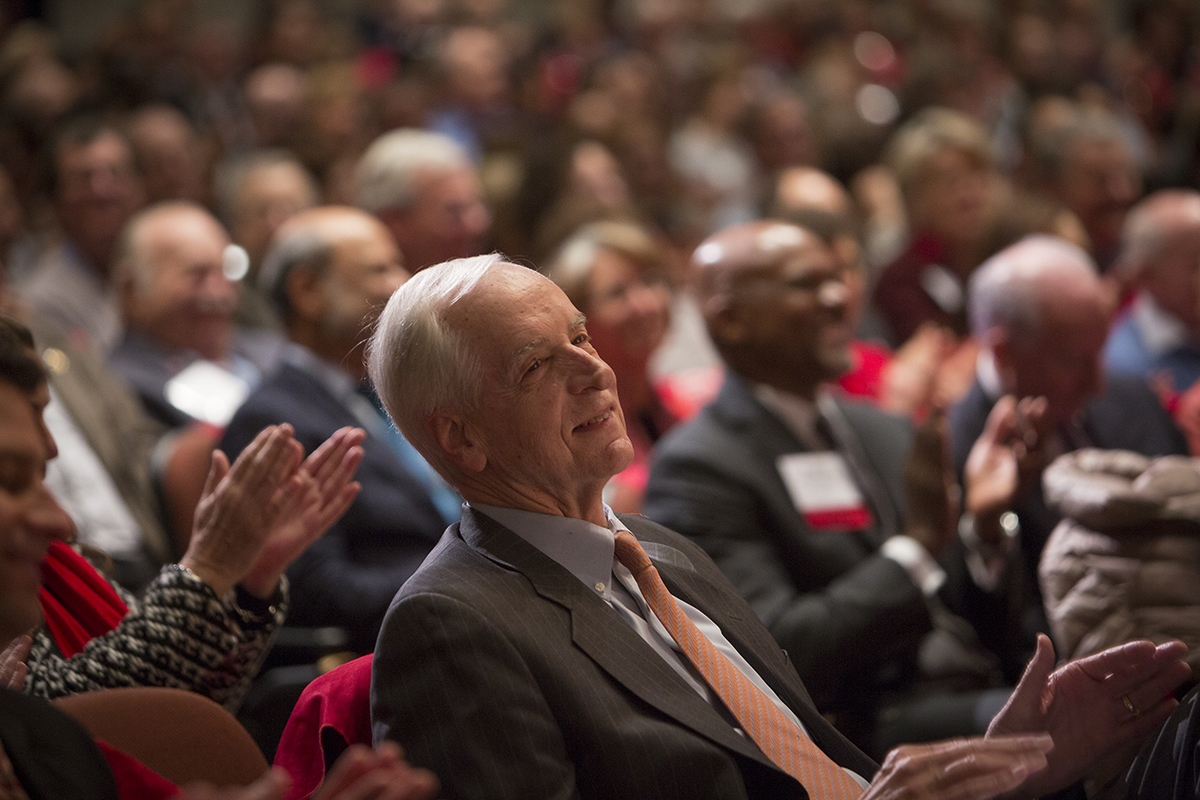Rawlings calls for 'One Cornell' in university address
By Nancy Doolittle
Cornell’s future lies in its ability to take full advantage of being the only institution in New York that bridges the divide between upstate and downstate, said Interim President Hunter Rawlings in his State of the University Address Oct. 28.
“We want to integrate our three New York state campuses – Ithaca, Weill Cornell Medicine and Cornell Tech – into a cohesive whole. We need to become ‘One Cornell,’” Rawlings told the audience of about 700 at the annual meeting of the Cornell Board of Trustees and University Council in Statler Auditorium. “If we succeed in connecting these parts, Cornell will become even stronger academically and in research, and will serve the state and the world more effectively,” he said.
The concept of “One Cornell” includes collaborating among the Ithaca schools and colleges; examining the undergraduate liberal arts curriculum across campus; and celebrating the “core principles that unite us, such as academic freedom, equity and generosity of spirit,” he said. “I see those principles evinced every day on our campus.”
The upstate-downstate divide “is not just a question of geography. It is also demographic, economic, cultural and political,” Rawlings said. Cornell has long helped bridge that divide through its joint educational venture with the state through the contract colleges and Cornell Cooperative Extension, he explained. More recently, Cornell and New York City have begun another such venture through Cornell Tech, which has been “inextricably tied” to Ithaca from its beginning.
In addition, a new “hinge project,” substantially helped by former board Chairman Peter Meinig ’61, will provide seed money and “flexible opportunities for our faculty to extend their influence to New York City,” Rawlings said.
Ties between Weill Cornell Medicine, Cornell Tech and Ithaca are also being strengthened through new collaborations in research and other areas, he said, including a new Center on the Physics of Cancer Metabolism; collaborations between researchers at the College of Veterinary Medicine and Weill Cornell Medicine to discover better treatments for lymphoma, which affects humans and dogs; and a Cornell Center for Health Equity that could positively impact health care in poor areas of upstate New York. A $2 million gift by Weill Cornell Medicine overseer Ellen Davis and Cornell trustee Gary Davis ’76, announced this week, will help research efforts at Weill Cornell Medicine in the fight against cancer and fund research collaborations among the three Cornell campuses, Rawlings said.
He cited other examples of collaborations between Ithaca and New York City through the Cornell Institute for Fashion and Fiber Innovation; the College of Architecture, Art and Planning’s studio space in New York City; the PROMISE project in the ILR School’s Yang-Tan Institute on Employment and Disability, which serves more than 1,300 New York City youth; and programs in food safety and Jewish history.

On the Ithaca campus, Rawlings has called for a comprehensive curriculum review across the seven undergraduate colleges. Already the College of Arts and Sciences has begun a review of its curriculum, which has implications for the other schools, as they depend on the Arts College to teach important parts of their curriculum, Rawlings said.
Comparing an education without the arts and humanities to a frame without a picture – hollow and devoid of meaning – Rawlings drew applause for affirming that “a liberal education is the best preparation for your whole life.”
The liberal arts teach how to read closely and critically, reason intelligently and ethically, speak and write clearly, do independent research, analyze quantitative arguments and have intellectual curiosity and a lifelong desire to keep learning, Rawlings said. “By freeing us from our prejudices, a liberal education also helps us understand and empathize with the viewpoints of those who are not like us,” he said.
While emphasizing that decisions about curricula belong to the faculty, Rawlings said, “I would like to see Cornell give strong and clear answers to the following questions: For tomorrow’s world, what should a well-educated person know? What should she be able to do with her mind? To contribute to society?”
When the faculty rethinks the curriculum, Rawlings said, “I hope it might consider putting the arts and humanities at the center of it, for all Cornell students.”
Being president of the university is not a job, Rawlings said. “It is a calling and it is a pleasure. I am surrounded by some of the smartest people in the world, some of the most generous people in the world … and by people whose lives have meaning and help give our lives meaning. Thank you for being Cornellians, and thank you for having Elizabeth and me back.”
Media Contact
Get Cornell news delivered right to your inbox.
Subscribe